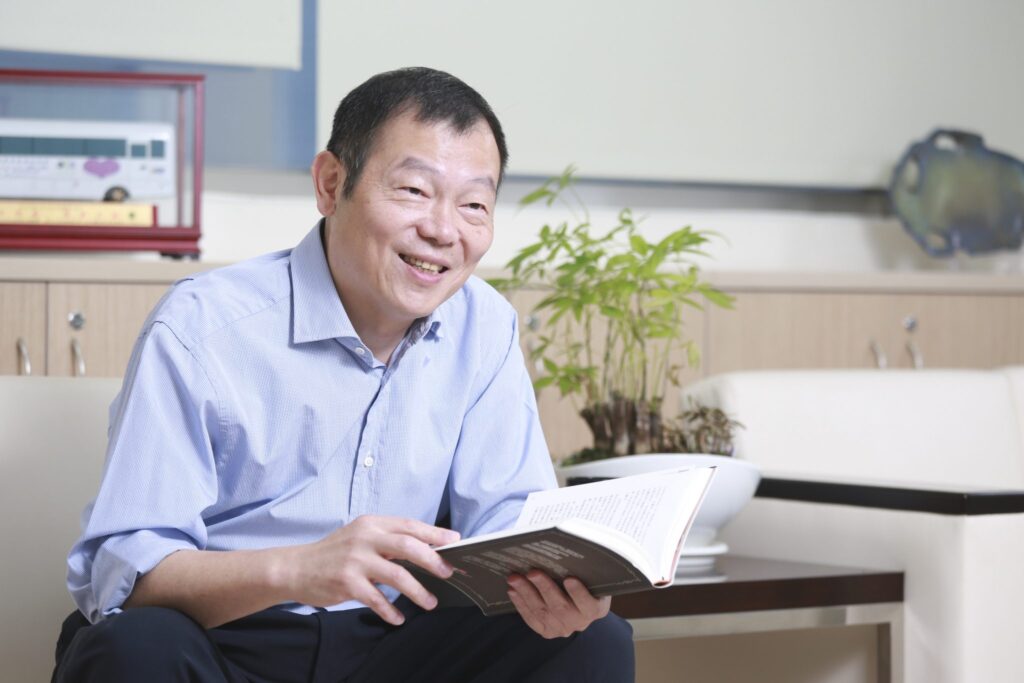Presidents of NYCU
IAIS Chi-Hung Lin, M.D., Ph.D. 林奇宏先生

President, National Yang Ming Chiao Tung University
Presidency:
2021~
About:
Born in Hsinchu, Taiwan (1961), Mr. Chi-Hung Lin graduated from National Yang Ming University (NYMU), now National Yang Ming Chiao Tung University (NYCU), with a degree of Bachelor of Medicine in 1986. He joined the post-graduate program of Yale University of the United States and was awarded a Ph.D. degree in the field of cell biology in 1994. In 1995, Dr. Lin became a faculty member in the Institute of Microbiology & Immunology (IMI), NYMU, where he was promoted to the rank of full professor in 2003.
Through his academic tenure, Dr. Lin had served as Director of IMI, Director of Cell Molecular Biology Research Center, Director of Instrumentation Resource Center, and Dean of the Office of International Affairs, NYMU, and Director of Department of Clinical Education and Research, Taipei City Hospital. In 2010-2014, Dr. Lin was appointed as Health Commissioner of Taipei City Government, and in 2014-2018, as Health Commissioner of New Taipei City Government. He pioneered many public health initiatives, including universal newborn hearing screening, high myopia prevention and fissure sealing for occlusal caries prevention for school age child, and disability prevention and rehabilitation program for the elderly, among others.
After returning to academics from public services, Dr. Lin served as the Vice President and Director of Center for Smart Healthcare of National Chiao Tung University (NCTU), Hsinchu. In 2021, Dr. Lin was elected as the first president of the newly established NYCU, which was founded by merging NYMU and NCTU.
Dr. Lin’s research interest focuses on cancer biology, especially on cancer metastasis and genomics. He is an expert in living cell/tissue microscopy, high throughput genomic and epigenomic analyses, and biomedical optoelectronics, and experienced in public health policies and their implementations.
President Lin has won many awards, including John R. Nicholas Outstanding Thesis Award by Yale University (1995), Outstanding Research Award by National Science Council (2004), Excellent Teacher Award by NYMU School of Medicine (2007), Outstanding Scientific & Technological Contribution Award by Executive Yuan (2009), and NYMU Outstanding Alumni Award (2013), Governmental Meritorious Medal by Executive Yuan (2018).
The best thing to do for a year is to sow grains; the best thing to do for ten years is to plant trees; the best thing to do for a hundred years is to educate people and train talents. What you gain from one year’s growth will be grains; what you gain from ten years’ growth will be trees; what you gain from a hundred years’ growth will be people.
—Guanzi Quanxiu—
The merge of NYMU and NCTU to become NYCU brings great expectation and challenges for unification and strategic development for the future. To answer these challenges, NYCU launched The Cultivation Plan, aiming to create a three-year development plan based on ten-year vision on trends of higher education. The plan emphasizes the following tasks:
- Strengthening liberal arts education
- Restructuring organization to promote interdisciplinary approaches
- Building bilingual campuses for global integration
- Bettering infrastructure to facilitate cross-campus teaching and researches
- Focusing on frontier science to enable future technologies
- Emphasizing academia-industry co-creation projects
- Investigating ethics, law and social impacts for the new era
- Branding and communication for the new university
- Predicting challenges for preemptive preparations
- Reassuring total quality management and sustainability
The advent of Industry 4.0 and Health 4.0 signifies that the world is about to undergo a dramatic change, brought forth by the high-functioning artificial intelligence and big data analytics, coupled with the ubiquitous 5G/6G wireless communication and the groundbreaking revolution of biomedical devices, treatments, and medications. Such an ever-changing future will inevitably influence the education people receive, the research they conduct, and the way they learn things. The world history will likely be divided into pre-pandemic and post-pandemic eras, wherein the lifestyles and social models at the individual and global levels will all have changed drastically in the post-pandemic period. As a new world awaits us, we must not only tackle the challenges ahead but also lead the change to shape our future.
If you want to go fast, go alone. If you want to go far, go together.
The world-sweeping pandemic has entrapped humans in a dark tunnel; perhaps, we are already seeing light at the end of this tunnel, which also brings a ray of hope. In the face of a catastrophic disaster, we must unite within the entire structure of society, and also contribute to the power of the university and fulfill our social responsibility.

